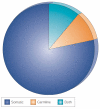A census of human cancer genes
- PMID: 14993899
- PMCID: PMC2665285
- DOI: 10.1038/nrc1299
A census of human cancer genes
Abstract
A central aim of cancer research has been to identify the mutated genes that are causally implicated in oncogenesis (‘cancer genes’). After two decades of searching, how many have been identified and how do they compare to the complete gene set that has been revealed by the human genome sequence? We have conducted a ‘census’ of cancer genes that indicates that mutations in more than 1% of genes contribute to human cancer. The census illustrates striking features in the types of sequence alteration, cancer classes in which oncogenic mutations have been identified and protein domains that are encoded by cancer genes.
Figures




References
-
- Reddy EP, Reynolds RK, Santos E, Barbacid M. A point mutation is responsible for the acquisition of transforming properties by the T24 human bladder carcinoma oncogene. Nature. 1982;300:149–152. - PubMed
-
- Tabin CJ, et al. Mechanism of activation of a human oncogene. Nature. 1982;300:143–149. [References 1 and 2 are seminal papers that defined the existence of oncogene sequences in cancer-cell genomes and that first identified a mutation involved in human cancer.] - PubMed
-
- Parsons R, et al. Hypermutability and mismatch repair deficiency in RER+ tumor cells. Cell. 1993;75:1227–1236. - PubMed
-
- Fishel R, et al. The human mutator gene homolog MSH2 and its association with hereditary nonpolyposis colon cancer. Cell. 1993;75:1027–1038. - PubMed
-
- Leach FS, et al. Mutations of a mutS homolog in hereditary nonpolyposis colorectal cancer. Cell. 1993;75:1215–1225. - PubMed
Publication types
MeSH terms
LinkOut - more resources
Full Text Sources
Other Literature Sources
Medical
Molecular Biology Databases

